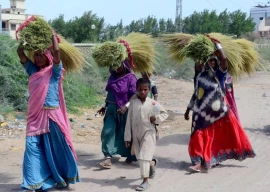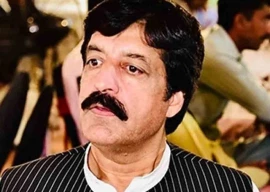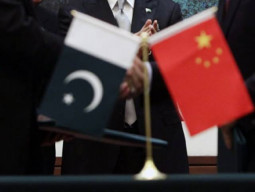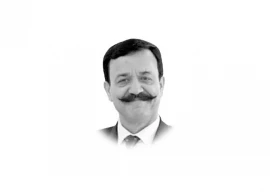The Baba and Bhit islands of Karachi are mostly inhabited by the Kutchi community. The islands were originally inhabited by the Sindhi Mohanas, who are still living there. Nonetheless, the most important thing about the islands is the office of the pir.
These views were shared by Dr Hasan Ali Khan, an assistant professor at the school of arts, humanities and social sciences of Habib University, on the third day of the Third International Karachi Conference at Arts Council of Pakistan on Sunday.
Khan spoke in detail of how the current pir took charge of the office. “The office of the pir plays the most important role in the social and religious organisation or hierarchy of the island,” said Dr Khan. The pir, 38-year-old Syed Shabbir Hussain Shah of the Qadiri Sufi order, sits on the larger island, which is the Baba Island, with a population of 17,000. Before him, the office was held by Syed Mehmood Shah Gilani, who is popularly known as Baba Saeen, added Dr Khan. When he died in 1992, his son, Abdul Qadir, and nephew, Shamsuddin, were nominated to succeed him. “Both refused to be the next pir,” narrated Dr Khan. Shabbir, who was 14 at the time, was nominated but refused to take charge of the office as he was very young.

For two years, the office remained vacant, after which, he was again nominated after a series of dreams seen by his father and uncle who saw the deceased Baba Saeen. “So, he very reluctantly accepted to be the pir in his teens,” said Dr Khan. “But he did not know what to do because he was not brought up to be the pir and he was not trained in the spiritual sciences that would give him the power to be a pir.”
Dr Khan said that according to Shabbir and the community, Baba Saeen’s soul began instructing him about the spiritual sciences and he eventually became proficient. “Initially, he didn’t know what to do,” he said. “It’s the irony of his life as he wasn’t trained to do this. And he didn’t take the money or the offerings that the followers would give him. After his sequence of dreams, he started taking the offerings.”
According to Dr Khan, in all this time, the personality of the dead man, Baba Saeen, looms ever large over the island. He said that Shabbir followed the same structure in religious organisation that prevailed at the time of Baba Saeen. “Every Friday, his followers come to him and confess their sins,” he said. “And their next duty is to get rid of the wrong or the sin.”
The other two speakers at the event were independent researcher and public historian Rabia Zafar and writer Aslam Khwaja. Zafar focused on her topic, ‘Linking Karachi via Air and Sea’, by talking about the different airlines and shipping lines pertaining to the city. She talked about Orient Airways, Pak Air and Pakistan International Airlines Corporation among others. She also showed images of aircrafts, ships, timetables and advertisements during her 20-minute presentation. Meanwhile, Khwaja talked about Karachi’s role in the freedom fight against British rule in 1946. He focused on the topic considering that next year, the freedom fight will complete its 70 years.
Published in The Express Tribune, November 9th, 2015.





























COMMENTS
Comments are moderated and generally will be posted if they are on-topic and not abusive.
For more information, please see our Comments FAQ